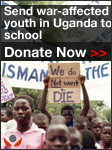LRA in DR Congo - potential to inflame regional animosities, AGAIN
Ugandan rebels force DRC army's hand
By David LewisKinshasa -
The Democratic Republic of Congo's army said on Sunday it would forcibly disarm 400 Ugandan rebels who have crossed into the northeast of the country and are refusing to lay down their weapons.A regional military commander, General Padiri Bulenda, said he would have to disarm the Lord's Resistance Army (LRA) rebels in order to prevent thousands of Ugandan soldiers from crossing the border into the Congo to hunt them down.Bulenda said he visited the heavily armed rebels on Sunday. The Congo government initially denied any knowledge of the rebels' presence in its territory."There are 400 of these Ugandan Lord's Resistance Army rebels in Congo and they are armed to the teeth," Bulenda, commander of the 9th military region, said in a telephonic interview after returning from his reconnaissance mission."I am seeking permission to get two battalions (1 400 men) to disarm the rebels, and the UN has said they will provide us with air support."He said the rebels had heavy machine guns and sophisticated communications equipment.United Nations peacekeepers also visited the town of Aba, which lies on Congo's remote northeast border with Uganda and Sudan, and said they had confirmed the presence of at least 300 LRA rebels who were refusing to disarm.Uganda's armed forces have said LRA deputy leader Vincent Otti sought political asylum in Democratic Republic of Congo last week after fleeing hideouts in southern Sudan with about 50 fighters accompanied by women and children.General Bulenda said on Sunday: "The rebels are refusing to disarm, this is not something we can accept. There are three brigades (over 10 000 men) of Ugandan soldiers just over the border in Sudan. Unless we disarm the rebels, the Ugandans will come in and chase them."Under a 2002 deal with Khartoum, Ugandan troops can pursue the rebels about 100km inside Sudan.Congo is struggling to organise elections after a string of peace deals ended a five-year war that sucked in six neighbouring countries and killed nearly 4-million people, mostly from hunger and disease.All foreign armies have been officially withdrawn. But the Democratic Republic of Congo accuses Uganda and Rwanda of continuing to meddle in its territory, where armed groups attack civilians and plunder the country's natural resources.For 19 years the LRA has terrorised isolated communities on both sides of Uganda's border with Sudan, uprooting 1,6-million people in northern Uganda alone.The group has no clear political goals but is notorious for massacring civilians, mutilating victims and abducting thousands of children as fighters, porters and sex slaves.Diplomats in Kinshasa said the LRA rebels should be disarmed but stressed the international community would not accept any intervention in Congo by the Ugandan army, which fought alongside Congolese rebels during the five-year war.UN peacekeepers frequently conduct joint operations with the Congolese army against armed groups operating in Congo two years after the war officially ended.But a UN spokesperson would not give any details on the support the mission could provide to deal with the LRA rebels.Uganda's President Yoweri Museveni has repeatedly warned Congo's fragile transitional government that he would take action against Ugandan rebels in Congo if he felt they were a threat to his country.A source close to Democratic Republic of Congo President Joseph Kabila called the presence of Ugandan soldiers on Congo's border "a distraction from pressure being applied on Museveni because of his meddling in Congo and attempts to prolong his presidency at home".



